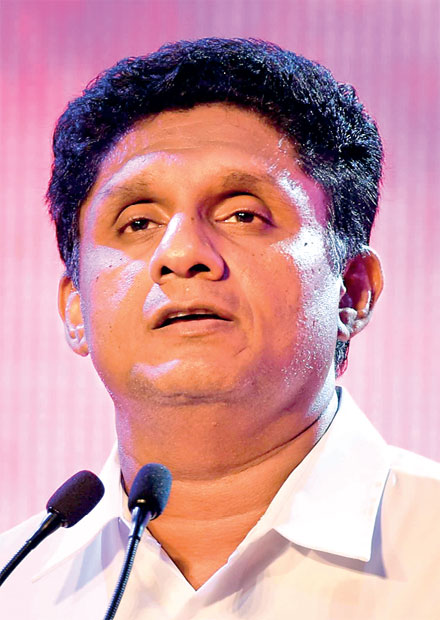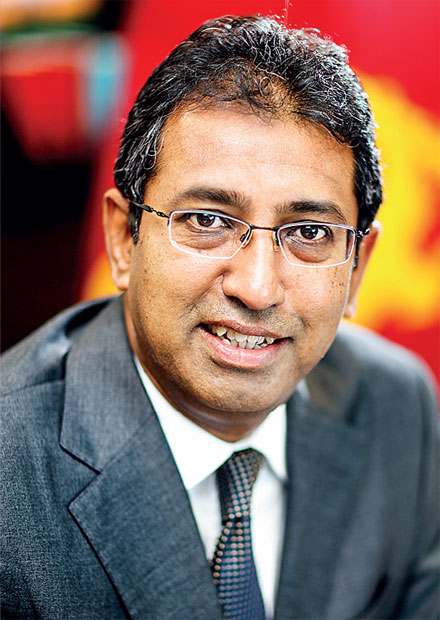Tuesday Feb 17, 2026
Tuesday Feb 17, 2026
Tuesday, 6 September 2022 02:46 - - {{hitsCtrl.values.hits}}

Sajith Premadasa

Dr. Harsha de Silva
|
 Preamble
Preamble
I wish to dedicate this article to the courageous members, activists and media personnel of Aragalaya making significant impact, resistance to aberrant practices hitherto followed, and triggering a pathway for transformation. Despite the expected outcomes yet to be achieved, this blueprint, is a product of several months of continuous, unwavering determination of all contributors.
The current Government with the participation of the Opposition hopefully and soon will transform what listed against short and medium to tangible benefits, guessing within 3-6 months and not beyond. It is also questionable in the present context and false pretence of multiparty engagement with the enacting COPF, COPE and COPA, handing them over to Opposition hands and to navigate the monumental tasks aligned to public expectation.
Although this 10-point action plan is targeted to revive Sri Lanka economically, it lacks action of addressing and recovery of Stolen Assets (StAR) in the medium to long term despite it spanning to long-term frame of reference. It is regrettable to note that the omission of StAR was either deliberate or forgotten and to conceal from the radar of the blueprint, being one of the core demands. The present Government aims that people may forget, have less concern, once the day-to-day livelihood is restored to normalcy.
Every Sri Lankan became a victim of heavy borrowings by the successive governments for building capital assets with no tangible or intangible ROI. As a result, Sri Lanka’s sovereign credit rating was downgraded preventing access to international money markets. Despite such issues which were clearly visible and brought to attention by Opposition in parliamentary debates, the CBSL hid the truth and painted a wrong picture of the economy.
Debt crisis
At a time when the twin deficits, primary and current accounts have climbed to unmanageable levels the SLPP Government changed their stance and decided to approach IMF for relief. It is now clear that getting IMF Extended Fund Facility (EFF) and Rapid Finance Facility are further delayed, leaving options for bridging finances from friendly nations either monetary support or exchange of goods, products and services in a barter setting. The former could further erode the non-alignment stance that we had back in 1970s.
Irrespective of the proposed Debt Stabilisation plan of IMF, proposed to reform against three core pillars which require assessment of impacts of day-to-day lives of citizens and especially the most vulnerable and design relief packages. For example, raising the interest rate at a time of weak exchange rate and rising inflation may result in enormous hardships to business, retires and ordinary folks. Therefore, the extent to which Sri Lanka could leverage the reforms to obtain IMF EFF need further discussion internally within Government and with IMF, not arousing public anger.
(a) Exchange rate, fiscal, and monetary reforms,
(b) Unshackling the economy from direct Government intervention, and
(c) Export development including removal of the import restriction regime
The “hair cut” on debts of local lenders should be delayed; it will have devastating impacts on many who are living from the interest incomes. Alternatively, I suggest to initiate early action to recover already declared defaulted loans by banks and financial institutions. As per media reports, billions of rupees have been wiped, mostly the defaulters were former politicians, people of high political affiliations and influences.
As suggested, converting debts into bonds and shares is a good option provided those institutions are listed in the stock market. The organisations that provide public utilities should not be privatised but require urgent restructure within Government space. It was revealed recently that some of the union officials are claiming 250 hours overtime per month only performing union welfare duties. These practices and corruptions need urgent attention to stop continuation as a short-term task.
Nevertheless, the restructuring of foreign debts has already been tasked to Lazard and Clifford Chance, Financial Legal Advisors; it is the duty of CBSL to monitor the progress and proceedings thus ensuring to bring optimum and favourable solutions with no adverse conditions attached and ultimately end up in selling assets.
Monetary and exchange rate policy settings
The Treasury and Central Bank are supposed to work in harmony. CBSL should act as an independent entity with no interference or manipulation by Treasury. In Sri Lanka, very recently we have seen this interworking mechanism drifted towards fulfilling political needs, primarily as a result of bringing in political appointees as governors. The effect of such moves is now conspicuous and Sri Lanka is quarrelling for survival. Furthermore, without proper valuation, CBSL printed billions of rupees causing high money circulation and resulted in inflation.
The current instability of exchange rate backed by recent moves of increasing the interest rates, raising the electricity tariffs, fuel and gas in a very short timespan were seen as taken by people of scanty knowledge of economic impacts without considering the holistic of the economic activities but to repair the accounts deficits. It is also important to be mindful to the fact that the salaries have not been increased and also rising unemployment. The prime function of CBSL is to control the inflation, unemployment, stability of currency and economic prosperity of the people. The publicity of providing financial assistance ‘Samurdi’ to counter the rising COL appears to be a laughable matter when the damage was done by decision makers. Nevertheless, the Samurdi network coverage requires expansion to bring those who were affected by this manmade downturn.
The monetary reforms, the blueprint proposed immediate intervention to redress the above mentioned through necessary intervention but haven’t discussed fiscal reforms in detail to curb the unnecessary expenditure, root out corruption of SOEs which are also interwoven with fiscal policies.
Revenue consolidation
Quote: In 1899 US Supreme Court stated in Nicol c Ames 173 US 509: “The power to tax is one great power upon which the whole national fabric is based. It is necessary to the existence of prosperity of a nation as is the air he breathes to a natural man. It is not only the power to destroy, but the power to keep alive.” Extrapolating the above statement, with the policies that were adopted immediately after installing the President in 2019, the tax base was reduced to 8% primary benefiting the business community; however, benefits did not flow through to the common man. Again, temporarily reduction of importation taxes on selected commodities were another example that created wide spread anger.
To reduce the burden of low-income groups, it is a necessity to restructure the PAYG tax system to increase the taxes of high-income groups and revise down the low-income groups. Increasing the indirect taxes on commodities will affect all consumers irrespective of income thresholds.
The effects of such moves evolve to a current crisis which erupted at Galle Face Green as a “Nirpakshika Aragalaya”, a non-political, non-violence struggle. The struggle is continuing in the same form but Government is now labelling them as a rebellion, guilefully supressing their voice by oppression and harassment.
Consolidation of revenue as listed in the Blueprint, as I see, is targeted to achieve IMF acceptance for EFF. However, on theory it looks professional, as indicated above we need to assess and validate overarching consequences, the hardships to general public as a result of increase taxes and tariffs. Will these moves increase the exports, competitiveness of goods and services in the international market, resolve unemployment both direct and indirect employment, etc.? Government aims to bring dollars by way of remittance from overseas workers and attract international visitors thus managing the economy for a short term with no long-term perspective and on the contrary to carry on with business for the full term.
It is also not to be forgotten to ensure increase in productivity with the optimal utilisation of assets. CPC Refinery closure was a good example of gross wastage of public funds.
Expenditure control
The primary aim should be to stop corrupted practices, cut waste and improve the efficiencies of all SOEs. In respect to capital funding all capital works should be reprioritised and delayed for the long-term. Privatisation is to be undertaken only for SOEs operating with losses thus unleased the control and accountability of the Treasury. The process of privatisation should not be limited to selling ventures outright but make provisions through market forces by way of acquiring majority stake of the organisation. This method facilitates Sri Lankans to buy some holdings and discourage multinationals making bids for acquisition and also prevents monopoly and price determinations.
Restructuring of SOEs shall be targeted to make organisations lean, agile both in terms of employee and processes. Excess staff should be given voluntary retirements or redundancies or importantly reemployed within the public sector on need basis. This is the practice being adopted elsewhere in the developed world where certain concessions are given for the affected for payment of bills on essential utilities, etc.
Additionally, funding for public tertiary education should be remodelled, not to be given free, soft loan schemes must be introduced so that once a student is employed and earning to pay back the loan in instalment in proportion to earnings. I fervently believe the old model of providing free university education is unsustainable and will not integrate with the market economy that SJB is advocating. This is a controversial issue that might have resistance, opposite views and theories but it’s a timely need for consideration.
It is worthwhile to reassess if Government intends to privatise utility organisation such as electricity generation, water supply and transport services which affects severely the livelihoods, in light of the current crisis situation it not advisable to sell but make them to operate as non-profit and costs recovering basis.
Sri Lanka hasn’t yet fully integrated to Global Production Network (GPN) where finished products and parts are to be manufactured locally, e.g. electronic and mechanical products/parts, software applications, etc. As per my recollection the Yahapalana Government failed to build the assembly plant for Volkswagen despite showcasing FDI inflow. The FDI inflows will also be beneficial to upskill staff and manage the level of unemployment. These activities will also create secondary employment opportunities in the areas of inland transportation and shipping businesses.
Energy and utilities reform
It is evident that Sri Lankans are very sensitive to fluctuations of tariffs as per market prices. It is therefore a necessity to maintain a long-term stability of pricings. As a suggestion, the pricing formula to be constructed based on the statistics over a full one-year cycle giving weightage on the average and median values and fixed for one year. The losses and profits to be debited on to consolidate funds to manage the fluctuation in price in the world market of diesel and coal, etc.
Sri Lanka has now jumped into the renewable energy bandwagon unconditionally with the overwhelming support of politicians and economists. It is therefore very important to make the right choices and mix of generation of electrical power. Renewable energy, wind and solar are seasonal and depend on the time of the day, further both have environmental impacts and the noise generated from wind farms create health issues if located in the proximity of living areas. Shutting down the fossil power generation out from the mix to save climate as sceptics overstress, need to be weighed in terms of economic impact to businesses to be competitive.
Public sector management and digitisation
The need for Fully Integrated Information System (FIIS) with redundancy, protection and cyber security has been highlighted previously in the articles published in Daily FT (ft.lk) by the writer. This is to be facilitated across all agencies including the health sector, Inland Revenue, Customs, Immigration and Emigration, licencing, etc. not limit to track the income and expenditure of SOEs and also to measure productivity, utilisation of assets, and the human capital for optimal gain.
As an example, each individual and business needs to have a Tax File Number and yearly tax return to be made mandatory. By enhancing the tax administration, the collection of taxes and avoidance by unscrupulous people could be easily traced and punished.
Public procurement is considered as an area of major corruptions and having FIIS will facilitate the transparency of all RFTs, RFPs and RFQs. The recent social media reports have highlighted the number of bribes taken in purchasing oil and gas and previously on COVID-19 vaccinations. It is unfortunate how the public funds are siphoned from the ailing economy of Sri Lanka.
|
Trade, industry, agriculture, and services promotion
Food security, market competitiveness, differentiation and promotions are key to recover from the crisis. The trade imbalance caused by importation of non-essentials, and abruptly switching to organic fertiliser, has aggravated the economic crisis. It appears that priorities have not been properly assessed, understood and certain policies intend to save dollars and others to drain dollars, thus working in opposite directions.
The trade barriers of import and export need urgent attention to bring healthy competitions crosses the boundaries. The bilateral and multilateral agreements need to structure in such manner not to have undue advantage to either party.
It was reported in the past that import restrictions have negatively affected Sri Lanka’s SME sector where the export-oriented products contain considerable foreign content as opposed to local content. As previously highlighted, Sri Lanka should integrate to GPN leveraging the skilled workforce and comparatively low wage structures. The stabilisation of exchange parity is a key to success and bring sustainable growth in import and export industries.
To create a competitive market place for the farmers to sell their produce at competitive rate without being exploited, misuse, misinformed by third parties. Creation of efficient transportation and access to market is very much a need and timely requirement.
Market reforms
As highlighted in the Blueprint, necessary reforms need to be undertaken to ‘Ease of Doing Business’. In addition, to what has been said, the robust legal system is necessary to handle disputes, facilitate and remove barriers for integration to GPN, attract FDI inflows with no unnecessary relaxation of duties and taxes. We need careful assessment to ensure the FDIs pay taxes in the host country thus prevent seeking tax havens elsewhere for avoidance.
Social safety nets
It is essential to look after the welfare of the low income and most vulnerable, the payments or tokens issues (monthly or fortnightly) to buy essentials need to be integrated to FIIS and with careful assessment to prevent exploitations by politicians for advantage of getting elected. The welfare payments should not be collected by individuals from Grama-Sevakas but be credited to accounts of the respective eligible individuals. Mobile phone apps may also be integrated to FIIS to increase the efficiency of the system.
Environment
While making pathway for ‘Ease of Doing Business’ it is of vital importance to preserve the environment and repair the devastations that occurred in the recent years, not to clear land in the guise of bringing FDIs and deforestation to continue. At the same time, the industrial waste management should be considered as a priority to prevent air pollution and waterways. The incident that occurred at Rathupaswella several years ago should not be repeated as a result of political thuggery thus helping mates.
Conclusion
Successive governments were highly skilled in producing roadmaps and showcasing initiatives but over the months nothing has been achieved or materialised. One was the ex-Governor showcasing the plan for recovery in October 2021. In another occasion, to build a technology hub in Sri Lanka with a YoY growth of $ 3 billion. All initiatives had failed completely until Sri Lanka became bankrupt.
While acknowledging the hard work of SJB subject matter experts, of producing a comprehensive blueprint for economic revival, it is also essential to prioritise the list tasks grouped in terms of M and L (viz: S: until staff-level agreement with IMF; M: up to Extended Fund Facility with IMF; L: Beyond). It shall not be limited to showcase the blueprint but to reap the benefits as expected in the short to long terms. The implementation of all initiatives should be taken to a single program, splitting into tangible tranches and projects managed by skilled program and project managers.
It is also alarming that some decisions are taken in favour of certain countries without equity and fairness, e.g. making plans and signing MoU with an Indian company to build a solar power generating plant and purchase electricity KWH paying dollars; such secret deals should be stopped forthwith and refer back to COPF, etc. for approval and the final go-ahead.
In respect to managing the COPXx by Opposition, these committees should be given the quasi status of a Senate aligned with Westminster governance where all initiatives should be finally stamped and approved by the ‘Senate’ before implementation. If such status and scrutiny were taken away by the SLPP cabinet the concept of multi-party will become dysfunctional and lead to a multi-dimensional crisis.